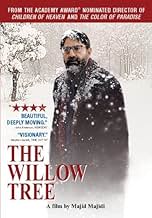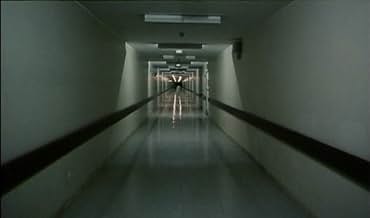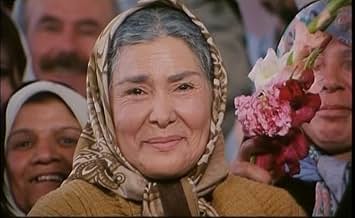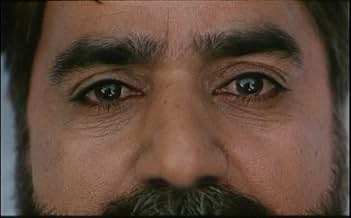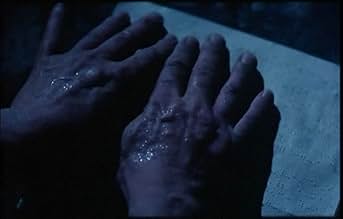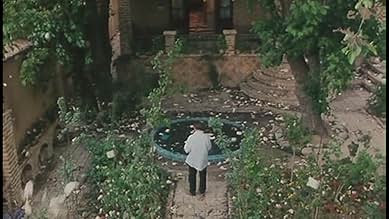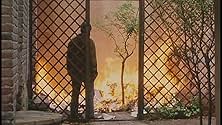IMDb RATING
7.3/10
4.6K
YOUR RATING
Youssef, a blind university professor, is suddenly diagnosed with a fatal disease and must undergo treatment in France. Back home, will he find the life he had before?Youssef, a blind university professor, is suddenly diagnosed with a fatal disease and must undergo treatment in France. Back home, will he find the life he had before?Youssef, a blind university professor, is suddenly diagnosed with a fatal disease and must undergo treatment in France. Back home, will he find the life he had before?
- Awards
- 2 wins & 2 nominations total
Soghra Obeisi
- Aziz
- (as Afarin Obeisi)
Leila Otadi
- Pari
- (as Leila Outadi)
Storyline
Featured review
Sometimes God works in mysterious ways, and us mortal man have absolutely no idea what to make of it, opting for the most parts to blame the big guy when things don't go our way, only to find out that the fault lies in ourselves. No, I'm not suddenly pious and wanting to spread the word, but Majid Majidi's The Willow Tree evoked such a feeling and reminder to myself, that it's always so easy to blame "somebody else", even though that someone could be the guy up there.
I haven't seen much of Majid Majidi's works, but from what I have in just Children of Heaven, and now The Willow Tree, I can't wait to watch a whole lot more. The stories might seem simple - few key characters (lovable too I might add), gorgeously shot, and you might think you have the plot all wrapped up, there's always this beauty in the simplicity of it all, and its powerful underlying message ever so subtle, in no way sledge-hammering itself on you at all. Somehow I feel that there's so much enveloping the movie, that I'm simply amazed at how they are all packaged together in a nicely paced movie, without the need to be butt- numbing.
Youssef (Parviz Parastui) is a blind university professor, who spends his time playing with his young daughter, and has his wife assist him with his work. From the onset, it's a happy little family, except that Youssef has a dream, that he could one day regain his sight and see again. Sometimes I wonder if able folks like us take things for granted naturally, and if only we lose it, do we start appreciating and missing something at all. Majid has for the first minute placed us in Youssef's shoes, and listening to his innermost thoughts and dreams, one ponders.
While faith is important, and I would think if I were in Youssef's shoes, I would also choose to turn to religion as a pillar of strength, there's this little warning of being careful with what you wish for, as sometimes, what you think is best for yourself, isn't true at all. If you made promises to the big man, make sure you can fulfill those promises, and not let it ring empty. We follow Youssef's journey and understand his fears, frustrations and hopes, coupled with his fall from grace and redemption. The Willow Tree leaves things wide open, but you can only hope for the best. I like the way how Youssef is forced to choose, and I actually felt pity for the guy as he loses himself, like the saying goes, because of his straying eye. I wonder too, if our gift of sight somehow will sometimes be the attributing factor, or seed the beginnings of mistrust, just because our eye sees something that our minds interpret differently, or fantasize.
And the movie couldn't work without the excellent soundtrack, or the commanding performance by the lead Parviz Parastui. He has one one hand made Youssef a likable fellow, yet managed in the same movie to make us despise his actions, with a tinge of pity, and at times, just wanting to slap him out of his arrogance. It's been a long while since I actually cared for a character, and want to reach out to him - as the bystanders usually have the better view of any situation - and to direct him, just as how you would a blind person, to avoid the pitfalls that seem set to dawn on him.
At another level, The Willow Tree has indeed opened my eyes to more of Iran, instead of those ra-ra sanctions filled news bulletins demonizing the country as a whole. I thought that through film, I see a little more of a country caught on celluloid, depicting the same hopes, dreams, and even challenges that folks in the country grapple with too. And with such intelligent stories from their filmmakers, you wonder about their rich culture, and also realize that you don't need big sets and big moments to create an impact - the little things in life that you can put into stories to tell, work just as majestically.
I haven't seen much of Majid Majidi's works, but from what I have in just Children of Heaven, and now The Willow Tree, I can't wait to watch a whole lot more. The stories might seem simple - few key characters (lovable too I might add), gorgeously shot, and you might think you have the plot all wrapped up, there's always this beauty in the simplicity of it all, and its powerful underlying message ever so subtle, in no way sledge-hammering itself on you at all. Somehow I feel that there's so much enveloping the movie, that I'm simply amazed at how they are all packaged together in a nicely paced movie, without the need to be butt- numbing.
Youssef (Parviz Parastui) is a blind university professor, who spends his time playing with his young daughter, and has his wife assist him with his work. From the onset, it's a happy little family, except that Youssef has a dream, that he could one day regain his sight and see again. Sometimes I wonder if able folks like us take things for granted naturally, and if only we lose it, do we start appreciating and missing something at all. Majid has for the first minute placed us in Youssef's shoes, and listening to his innermost thoughts and dreams, one ponders.
While faith is important, and I would think if I were in Youssef's shoes, I would also choose to turn to religion as a pillar of strength, there's this little warning of being careful with what you wish for, as sometimes, what you think is best for yourself, isn't true at all. If you made promises to the big man, make sure you can fulfill those promises, and not let it ring empty. We follow Youssef's journey and understand his fears, frustrations and hopes, coupled with his fall from grace and redemption. The Willow Tree leaves things wide open, but you can only hope for the best. I like the way how Youssef is forced to choose, and I actually felt pity for the guy as he loses himself, like the saying goes, because of his straying eye. I wonder too, if our gift of sight somehow will sometimes be the attributing factor, or seed the beginnings of mistrust, just because our eye sees something that our minds interpret differently, or fantasize.
And the movie couldn't work without the excellent soundtrack, or the commanding performance by the lead Parviz Parastui. He has one one hand made Youssef a likable fellow, yet managed in the same movie to make us despise his actions, with a tinge of pity, and at times, just wanting to slap him out of his arrogance. It's been a long while since I actually cared for a character, and want to reach out to him - as the bystanders usually have the better view of any situation - and to direct him, just as how you would a blind person, to avoid the pitfalls that seem set to dawn on him.
At another level, The Willow Tree has indeed opened my eyes to more of Iran, instead of those ra-ra sanctions filled news bulletins demonizing the country as a whole. I thought that through film, I see a little more of a country caught on celluloid, depicting the same hopes, dreams, and even challenges that folks in the country grapple with too. And with such intelligent stories from their filmmakers, you wonder about their rich culture, and also realize that you don't need big sets and big moments to create an impact - the little things in life that you can put into stories to tell, work just as majestically.
- DICK STEEL
- Aug 19, 2007
- Permalink
Details
Box office
- Gross US & Canada
- $25,752
- Opening weekend US & Canada
- $6,048
- Aug 5, 2007
- Gross worldwide
- $51,499
- Runtime1 hour 36 minutes
- Color
- Sound mix
- Aspect ratio
- 1.85 : 1
Contribute to this page
Suggest an edit or add missing content


